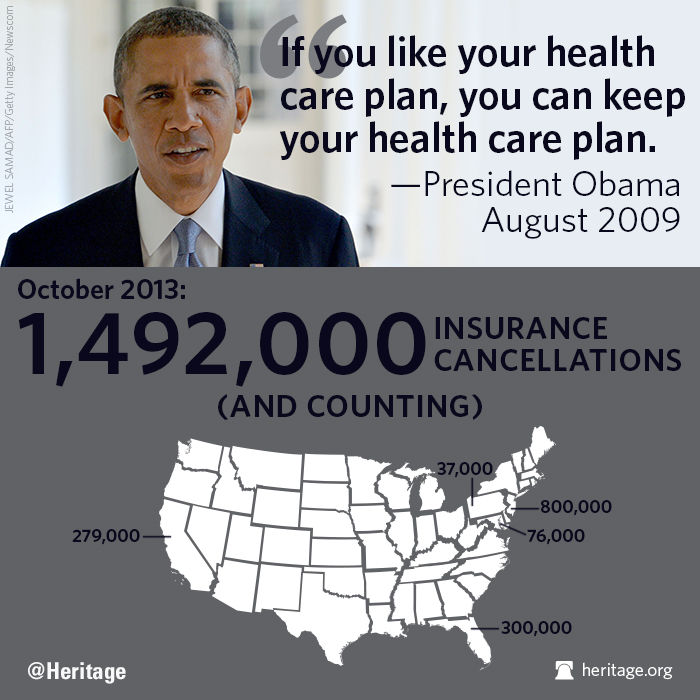
Healthcare coverage cancelled? More problems for Obamacare.
As the story of the highly troubled Obamacare website continues to unfold, even more unpleasant new surprises are surfacing in the wake of the Affordable Care Act. Since August of this year, literally hundreds of thousands of Americans have received cancellation notices from their health insurance providers. And literally every one of the recipients notified has been among one of the primary groups for which Obamacare ostensibly was designed: people who must purchase their own health insurance. Latest indicators show that Obamacare Insurance Cancellations are running rampant, and those who need coverage most, may be the ones who are in jeopardy of losing the insurance they had.
The following are but a few examples in this massive wave of cancellations:
- Florida Blue sent out 300,000 cancellation notices, which amounts to 80 percent of the state’s individual coverage policies.
- In California, Kaiser Permanente canceled 160,000 plans, approximately half of the population it insures in the golden state.
- In mid-September, Blue Shield of California sent 119,000 cancellation notices.
- Insurance provider Highmark, Inc., located in Pittsburgh, Pennsylvania plans to cancel 20 percent of its plans.
- Independence Blue Cross in Philadelphia, Pennsylvania will cancel 45 percent.
- In the state of New Jersey, nearly 800,000 insured lives will no longer be covered as of 2014.
Clearly, this is not an isolated problem. Estimates place more than 12 million Americans at risk of losing health care coverage because their individual policies do not meet the requirements set forth in the terms of the Affordable Care Act.
So what are these requirements, anyway?
There are exactly ten “essential health benefits,” which Healthcare.gov lists as follows:
- Outpatient care—the kind you get without being admitted to a hospital.
- Trips to the emergency room.
- Treatment in the hospital for inpatient care.
- Care before and after your baby is born.
- Mental health and substance use disorder services: This includes behavioral health treatment, counseling, and psychotherapy.
- Your prescription drugs.
- Services and devices to help you recover if you are injured, or have a disability or chronic condition. This includes physical and occupational therapy, speech-language pathology, psychiatric rehabilitation, and more.
- Your lab tests.
- Preventive services including counseling, screenings, and vaccines to keep you healthy and care for managing a chronic disease.
- Pediatric services: This includes dental care and vision care for kids.
Under the terms of the Affordable Care Act, policies that do not meet these requirements – but were issued before the new law passed Congress in 2010 – will be not be cancelled. However, if you were among the many who purchased a policy after the law’s passage, the news is not as good.
Interestingly, these cancellations appear to directly contradict several of Obama’s earlier statements. Prior to passage of the Affordable Care Act in 2012, he assured that, “If you like your plan, keep your plan.” More recently, he elaborated on the topic, stating, “If you had one of these substandard plans before the Affordable Care Act became law, and you really like that plan, you are able to keep it.”
However, in an attempt to qualify his earlier statements, the president explained, “If you have or had one of these plans before the Affordable Care Act came into law, and you really like that plan, what we said was you could keep it if it hasn’t changed since the law passed.”
In a recent statement to NBC News, Obama attempted an apology, stating, “Even though it’s a small percentage of folks who may be disadvantaged, you know, it means a lot to them. And it’s scary to them. And I am sorry that they, you know, are finding themselves in this situation, based on assurances they got from me. We’ve got to work hard to make sure that they know we hear them and that we’re going to do everything we can to deal with folks who find themselves in a tough position as a consequence of this. … Obviously, we didn’t do a good enough job in terms of how we crafted the law. And, you know, that’s something that I regret. That’s something that we’re going to do everything we can to get fixed.”
Despite these problems, the president contends that many of those whose insurance has or will be cancelled will ultimately be able to purchase better coverage at lower cost. In the meantime however, House Speaker John Boehner says that “the House will vote next week to allow anyone with a health care plan they like to keep it. If the President is sincerely sorry that he misled the American people, the very least he can do is support this bipartisan effort. Otherwise, this apology doesn’t amount to anything.”
As the law currently stands, Americans who do not purchase insurance and are not covered by Medicaid or other government insurance will face monetary penalties. Uninsured individuals would be forced to pay $95 or 1 percent of income above $10,000, whichever is greater. And for families, the penalty would be even higher, reaching $285 or 1 percent of income above $20,000, whichever is greater. Under current law, penalties are scheduled to increase in 2015 and 2016.
In an attempt to delay these penalties, Senators Joe Manchin (D) of West Virginia and Mark Kirk (R) of Illinois have introduced the Manchin-Kirk bill, which would prevent the issue of such penalties before January 1, 2015.
